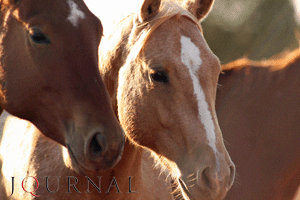From KCRG.com, April 2, 2014 — The Iowa Department of Agriculture confirmed that a single case of equine herpesvirus type-1 was recently discovered in Marion, Iowa, at Crystal Creek Equine Center. A department spokesperson said Monday that the investigation is ongoing, reported KRCG.com.
EHV-1 Outbreaks Across United States

The Iowa Equestrian Center at Kirkwood Community College has already taken steps to avoid the virus. They cancelled a barrel racing that was already scheduled Apri 4-6, and are now working on disinfecting its 210-stall barn as a precaution. Kirkwood hosts large horse shows and as a result, see lots of horses that visit from out of state.
Dr. Charles Abraham helped diagnose the EHV-1 case at Crystal Creek Equine Center. He said that horse came from Minnesota, and the symptoms of this strain are troubling.
“Our concern is that the horses in Minnesota and the horses in Wisconsin that had neurological symptoms, and tested positive for EHV-1, but did not test positive for the neurogenic form, our concern is, those horses are still dying,” said Dr. Abraham.
Read more from KRCG.com.
From Colorado State University Extension, April 1, 2014 — On March 26, 2014, the Colorado state veterinarian’s office was notified by the Colorado State University Diagnostic Laboratory that a Larimer County horse tested positive for EHV-1. CDA is investigating the positive case and has placed the facility where the horse is stabled under quarantine. The horse is undergoing treatment and others it may have come into contact with are being monitored but are not showing clinical signs of the disease at this point. At this time the affected horse is the only horse showing any clinical signs of disease and is recovering.
“The most common way for EHV-1 to spread is by direct horse-to-horse contact but it can also spread through the air, contaminated equipment, clothing and hands; this certainly highlights the importance of practicing basic biosecurity practices,” said Colorado state veterinarian, Dr. Keith Roehr.
“Equine event organizers should continue to practice routine biosecurity practices that are effective in prevention of EHV and other horse diseases as well. There was very limited movement from the affected facility so the risk to other horse owners or event organizers is very low, essentially the same as before this index case.”Read more from Colorado State University Extension.
From the Minnesota Board of Animal Health, March 31, 2014 — Equine herpesvirus type-1 has recently been identified in horses in parts of Minnesota and Wisconsin.
Six Minnesota horses have tested positive for EHV-1 infection (non-neuropathogenic strain). Two of the positive cases are horses on the same premises in Chisago County. One of these horses has made a full recovery; the other was euthanized.
There is one confirmed case in Dakota County. This horse has been euthanized. Three other positive horses are located in Freeborn, Hennepin and Wright counties. All of these horses are recovering. Test results are pending for a second horse in Wright County.
The neuropathogenic strain of EHV-1 is a reportable disease in Minnesota. Test results that are confirmed to be the neuropathogenic strain of EHV-1 must be forwarded to the Minnesota Board of Animal Health.
The University of Minnesota Center for Animal Health and Food Safety recommends that horses with a fever and symptoms of contagious respiratory infection should be kept at home and not taken to shows, clinics or public trail rides. Horse owners should also be aware that transportation of horses to competitions, shows and clinics may increase the risk of exposure to infectious organisms. Owners of affected horses should wash and disinfect their hands and change their clothes before coming into contact with healthy horses to prevent the potential spread of these infectious organisms.
The Minnesota Board of Animal Health will provide updates as the situation evolves.
Map of Minnesota EHV-1 Cases
From the Wisconsin Department of Agriculture, Trade and Consumer Protection, March 31, 2014 — There have been a small number of reports from horse owners in parts of western Wisconsin and eastern Minnesota of horses showing acute neurologic signs, which could be symptoms of equine herpesvirus type-1.
Two possible cases in western Wisconsin have been reported so far to the state veterinarian’s office. In one case, test results on a horse in Polk County came back positive for EHV-1. That horse is recovering. Test results from another horse in Burnett County are still pending, but that horse has already been euthanized.
The animal health division of the Wisconsin Department of Agriculture, Trade and Consumer Protection has been updating veterinarians to be watchful for horses showing acute neurological signs with a reminder that confirmed positive test results for EHV must be reported within 10 days to the Division of Animal Health at the Wisconsin Department of Agriculture, Trade and Consumer Protection.
The Wisconsin state veterinarian recommends that horses with a fever and symptoms of contagious respiratory infection should be kept at home and not taken to shows, competitions, clinics or public trail rides. Horse owners should also be aware that transportation of horses to competitions, shows and clinics may increase the risk of exposure to infectious organisms. Although humans can’t be infected by EHV-1, they can aid in spreading it to their horses. Therefore, owners of affected horses should wash and disinfect their hands and change their clothes before coming into contact with healthy horses to prevent the potential spread of these infectious organisms.
EHV-1 Preparedness
Please use these resources regarding EHV-1 and biosecurity, brought to you by The American Quarter Horse Journal:
Travel Safely: Good biosecurity both at home and on the road will help keep your horses healthy.The Facts on EHV-1: Recognize the signs of equine herpesvirus-1 and learn how to protect your horse from the risks of the virus.To learn more about EHV-1, visit the AQHA EHV-1 Information page.





